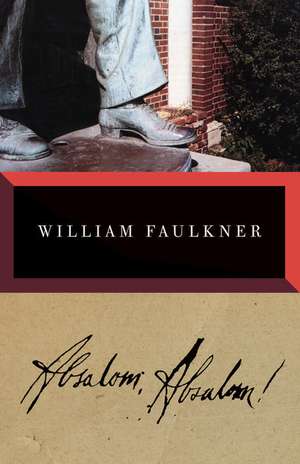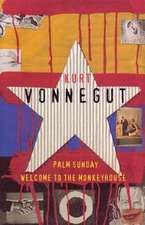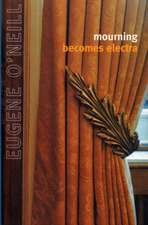Absalom, Absalom!: The Corrected Text
Autor William Faulkneren Limba Engleză Paperback – 29 ian 1991
Absalom, Absalom! is Faulkner’s epic tale of Thomas Sutpen, an enigmatic stranger who comes to Jefferson, Mississippi, in the early 1830s to wrest his mansion out of the muddy bottoms of the north Mississippi wilderness. He was a man, Faulkner said, “who wanted sons and the sons destroyed him.”
| Toate formatele și edițiile | Preț | Express |
|---|---|---|
| Paperback (2) | 54.35 lei 24-35 zile | +21.09 lei 4-10 zile |
| Random House – 19 ian 1995 | 54.35 lei 24-35 zile | +21.09 lei 4-10 zile |
| Vintage Books USA – 29 ian 1991 | 90.95 lei 3-5 săpt. | +25.59 lei 4-10 zile |
| Hardback (1) | 149.11 lei 3-5 săpt. | |
| KUPERARD (BRAVO LTD) – 16 ian 2000 | 149.11 lei 3-5 săpt. |
Preț: 90.95 lei
Nou
Puncte Express: 136
Preț estimativ în valută:
17.40€ • 18.07$ • 14.51£
17.40€ • 18.07$ • 14.51£
Carte disponibilă
Livrare economică 04-18 martie
Livrare express 15-21 februarie pentru 35.58 lei
Preluare comenzi: 021 569.72.76
Specificații
ISBN-13: 9780679732181
ISBN-10: 0679732187
Pagini: 320
Ilustrații: 1 Ktn.-Skizz.
Dimensiuni: 133 x 206 x 18 mm
Greutate: 0.23 kg
Ediția:The corrected text.
Editura: Vintage Books USA
Colecția Vintage Books
ISBN-10: 0679732187
Pagini: 320
Ilustrații: 1 Ktn.-Skizz.
Dimensiuni: 133 x 206 x 18 mm
Greutate: 0.23 kg
Ediția:The corrected text.
Editura: Vintage Books USA
Colecția Vintage Books
Extras
From a little after two oclock until almost sundown of the long still hot weary dead September afternoon they sat in what Miss Coldfield still called the office because her father had called it that-a dim hot airless room with the blinds all closed and fastened for forty-three summers because when she was a girl someone had believed that light and moving air carried heat and that dark was always cooler, and which (as the sun shone fuller and fuller on that side of the house) became latticed with yellow slashes full of dust motes which Quentin thought of as being flecks of the dead old dried paint itself blown inward from the scaling blinds as wind might have blown them. There was a wistaria vine blooming for the second time that summer on a wooden trellis before one window, into which sparrows came now and then in random gusts, making a dry vivid dusty sound before going away: and opposite Quentin, Miss Coldfield in the eternal black which she had worn for forty-three years now, whether for sister, father, or nothusband none knew, sitting so bolt upright in the straight hard chair that was so tall for her that her legs hung straight and rigid as if she had iron shinbones and ankles, clear of the floor with that air of impotent and static rage like children's feet, and talking in that grim haggard amazed voice until at last listening would renege and hearing-sense self-confound and the long-dead object of her impotent yet indomitable frustration would appear, as though by outraged recapitulation evoked, quiet inattentive and harmless, out of the biding and dreamy and victorious dust.
Her voice would not cease, it would just vanish. There would be the dim coffin-smelling gloom sweet and oversweet with the twice-bloomed wistaria against the outer wall by the savage quiet September sun impacted distilled and hyperdistilled, into which came now and then the loud cloudy flutter of the sparrows like a flat limber stick whipped by an idle boy, and the rank smell of female old flesh long embattled in virginity while the wan haggard face watched him above the faint triangle of lace at wrists and throat from the too tall chair in which she resembled a crucified child; and the voice not ceasing but vanishing into and then out of the long intervals like a stream, a trickle running from patch to patch of dried sand, and the ghost mused with shadowy docility as if it were the voice which he haunted where a more fortunate one would have had a house. Out of quiet thunderclap he would abrupt (man-horse-demon) upon a scene peaceful and decorous as a schoolprize water color, faint sulphur-reek still in hair clothes and beard, with grouped behind him his band of wild niggers like beasts half tamed to walk upright like men, in attitudes wild and reposed, and manacled among them the French architect with his air grim, haggard, and tatterran. Immobile, bearded and hand palm-lifted the horseman sat; behind him the wild blacks and the captive architect huddled quietly, carrying in bloodless paradox the shovels and picks and axes of peaceful conquest. Then in the long unamaze Quentin seemed to watch them overrun suddenly the hundred square miles of tranquil and astonished earth and drag house and formal gardens violently out of the soundless Nothing and clap them down like cards upon a table beneath the up-palm immobile and pontific, creating the Sutpen's Hundred, the Be Sutpen's Hundred like the oldentime Be Light. Then hearing would reconcile and he would seem to listen to two separate Quentins now-the Quentin Compson preparing for Harvard in the South, the deep South dead since 1865 and peopled with garrulous outraged baffled ghosts, listening, having to listen, to one of the ghosts which had refused to lie still even longer than most had, telling him about old ghost-times; and the Quentin Compson who was still too young to deserve yet to be a ghost but nevertheless having to be one for all that, since he was born and bred in the deep South the same as she was-the two separate Quentins now talking to one another in the long silence of notpeople in notlanguage, like this: It seems that this demon-his name was Sutpen-(Colonel Sutpen)-Colonel Sutpen. Who came out of nowhere and without warning upon the land with a band of strange niggers and built a plantation -(Tore violently a plantation, Miss Rosa Coldfield says)-tore violently. And married her sister Ellen and begot a son and a daughter which-(Without gentleness begot, Miss Rosa Coldfield says)-without gentleness. Which should have been the jewels of his pride and the shield and comfort of his old age, only-(Only they destroyed him or something or he destroyed them or something. And died)-and died. Without regret, Miss Rosa Coldfield says-(Save by her) Yes, save by her. (And by Quentin Compson) Yes. And by Quentin Compson.
"Because you are going away to attend the college at Harvard they tell me," she said. "So I dont imagine you will ever come back here and settle down as a country lawyer in a little town like Jefferson since Northern people have already seen to it that there is little left in the South for a young man. So maybe you will enter the literary profession as so many Southern gentlemen and gentlewomen too are doing now and maybe some day you will remember this and write about it. You will be married then I expect and perhaps your wife will want a new gown or a new chair for the house and you can write this and submit it to the magazines. Perhaps you will even remember kindly then the old woman who made you spend a whole afternoon sitting indoors and listening while she talked about people and events you were fortunate enough to escape yourself when you wanted to be out among young friends of your own age."
"Yessum," Quentin said. Only she dont mean that he thought. It's because she wants it told. It was still early then. He had yet in his pocket the note which he had received by the hand of a small negro boy just before noon, asking him to call and see her-the quaint, stiffly formal request which was actually a summons, out of another world almost-the queer archaic sheet of ancient good notepaper written over with the neat faded cramped script which, due to his astonishment at the request from a woman three times his age and whom he had known all his life without having exchanged a hundred words with her or perhaps to the fact that he was only twenty years old, he did not recognise as revealing a character cold, implacable, and even ruthless. He obeyed it immediately after the noon meal, walking the half mile between his home and hers through the dry dusty heat of early September and so into the house (it too somehow smaller than its actual size-it was of two storeys-unpainted and a little shabby, yet with an air, a quality of grim endurance as though like her it had been created to fit into and complement a world in all ways a little smaller than the one in which it found itself) where in the gloom of the shuttered hallway whose air was even hotter than outside, as if there were prisoned in it like in a tomb all the suspiration of slow heat-laden time which had recurred during the forty-three years, the small figure in black which did not even rustle, the wan triangle of lace at wrists and throat, the dim face looking at him with an expression speculative, urgent, and intent, waited to invite him in.
It's because she wants it told he thought so that people whom she will never see and whose names she will never hear and who have never heard her name nor seen her face will read it and know at last why God let us lose the War: that only through the blood of our men and the tears of our women could He stay this demon and efface his name and lineage from the earth. Then almost immediately he decided that neither was this the reason why she had sent the note, and sending it, why to him, since if she had merely wanted it told, written and even printed, she would not have needed to call in anybody-a woman who even in his (Quentin's) father's youth had already established (even if not affirmed) herself as the town's and the county's poetess laureate by issuing to the stern and meagre subscription list of the county newspaper poems, ode eulogy and epitaph, out of some bitter and implacable reserve of undefeat; and these from a woman whose family's martial background as both town and county knew consisted of the father who, a conscientious objector on religious grounds, had starved to death in the attic of his own house, hidden (some said, walled up) there from Confederate provost marshals' men and fed secretly at night by this same daughter who at the very time was accumulating her first folio in which the lost cause's unregenerate vanquished were name by name embalmed; and the nephew who served for four years in the same company with his sister's fiance and then shot the fiance to death before the gates to the house where the sister waited in her wedding gown on the eve of the wedding and then fled, vanished, none knew where.
It would be three hours yet before he would learn why she had sent for him because this part of it, this first part of it, Quentin already knew. It was a part of his twenty years' heritage of breathing the same air and hearing his father talk about the man; a part of the town's-Jefferson's-eighty years' heritage of the same air which the man himself had breathed between this September afternoon in 1909 and that Sunday morning in June in 1833 when he first rode into town out of no discernible past and acquired his land no one knew how and built his house, his mansion, apparently out of nothing and married Ellen Coldfield and begot his two children-the son who widowed the daughter who had not yet been a bride-and so accomplished his allotted course to its violent (Miss Coldfield at least would have said, just) end. Quentin had grown up with that; the mere names were interchangeable and almost myriad. His childhood was full of them; his very body was an empty hall echoing with sonorous defeated names; he was not a being, an entity, he was a commonwealth. He was a barracks filled with stubborn back-looking ghosts still recovering, even forty-three years afterward, from the fever which had cured the disease, waking from the fever without even knowing that it had been the fever itself which they had fought against and not the sickness, looking with stubborn recalcitrance backward beyond the fever and into the disease with actual regret, weak from the fever yet free of the disease and not even aware that the freedom was that of impotence.
("But why tell me about it?" he said to his father that evening, when he returned home, after she had dismissed him at last with his promise to return for her in the buggy; "why tell me about it? What is it to me that the land or the earth or whatever it was got tired of him at last and turned and destroyed him? What if it did destroy her family too? It's going to turn and destroy us all someday, whether our name happens to be Sutpen or Coldfield or not."
"Ah," Mr Compson said. "Years ago we in the South made our women into ladies. Then the War came and made the ladies into ghosts. So what else can we do, being gentlemen, but listen to them being ghosts?" Then he said, "Do you want to know the real reason why she chose you?" They were sitting on the gallery after supper, waiting for the time Miss Coldfield had set for Quentin to call for her. "It's because she will need someone to go with her-a man, a gentleman, yet one still young enough to do what she wants, do it the way she wants it done. And she chose you because your grandfather was the nearest thing to a friend which Sutpen ever had in this county, and she probably believes that Sutpen may have told your grandfather something about himself and her, about that engagement which did not engage, that troth which failed to plight. Might even have told your grandfather the reason why at the last she refused to marry him. And that your grandfather might have told me and I might have told you. And so, in a sense, the affair, no matter what happens out there tonight, will still be in the family; the skeleton (if it be a skeleton) still in the closet. She may believe that if it hadn't been for your grandfather's friendship, Sutpen could never have got a foothold here, and that if he had not got that foothold, he could not have married Ellen. So maybe she considers you partly responsible through heredity for what happened to her and her family through him.")
Whatever her reason for choosing him, whether it was that or not, the getting to it, Quentin thought, was taking a long time. Meanwhile, as though in inverse ratio to the vanishing voice, the invoked ghost of the man whom she could neither forgive nor revenge herself upon began to assume a quality almost of solidity, permanence. Itself circumambient and enclosed by its effluvium of hell, its aura of unregeneration, it mused (mused, thought, seemed to possess sentience, as if, though dispossessed of the peace-who was impervious anyhow to fatigue-which she declined to give it, it was still irrevocably outside the scope of her hurt or harm) with that quality peaceful and now harmless and not even very attentive-the ogre-shape which, as Miss Coldfield's voice went on, resolved out of itself before Quentin's eyes the two half-ogre children, the three of them forming a shadowy background for the fourth one. This was the mother, the dead sister Ellen: this Niobe without tears who had conceived to the demon in a kind of nightmare, who even while alive had moved but without life and grieved but without weeping, who now had an air of tranquil and unwitting desolation, not as if she had either outlived the others or had died first, but as if she had never lived at all. Quentin seemed to see them, the four of them arranged into the conventional family group of the period, with formal and lifeless decorum, and seen now as the fading and ancient photograph itself would have been seen enlarged and hung on the wall behind and above the voice and of whose presence there the voice's owner was not even aware, as if she (Miss Coldfield) had never seen this room before-a picture, a group which even to Quentin had a quality strange, contradictory and bizarre; not quite comprehensible, not (even to twenty) quite right-a group the last member of which had been dead twenty-five years and the first, fifty, evoked now out of the airless gloom of a dead house between an old woman's grim and implacable unforgiving and the passive chafing of a youth of twenty telling himself even amid the voice Maybe you have to know anybody awful well to love them but when you have hated somebody for forty-three years you will know them awful well so maybe it's better then maybe it's fine then because after forty-three years they cant any longer surprise you or make you either very contented or very mad. And maybe it (the voice, the talking, the incredulous and unbearable amazement) had even been a cry aloud once, Quentin thought, long ago when she was a girl-of young and indomitable unregret, of indictment of blind circumstance and savage event; but not now: now only the lonely thwarted old female flesh embattled for forty-three years in the old insult, the old unforgiving outraged and betrayed by the final and complete affront which was Sutpen's death:
Her voice would not cease, it would just vanish. There would be the dim coffin-smelling gloom sweet and oversweet with the twice-bloomed wistaria against the outer wall by the savage quiet September sun impacted distilled and hyperdistilled, into which came now and then the loud cloudy flutter of the sparrows like a flat limber stick whipped by an idle boy, and the rank smell of female old flesh long embattled in virginity while the wan haggard face watched him above the faint triangle of lace at wrists and throat from the too tall chair in which she resembled a crucified child; and the voice not ceasing but vanishing into and then out of the long intervals like a stream, a trickle running from patch to patch of dried sand, and the ghost mused with shadowy docility as if it were the voice which he haunted where a more fortunate one would have had a house. Out of quiet thunderclap he would abrupt (man-horse-demon) upon a scene peaceful and decorous as a schoolprize water color, faint sulphur-reek still in hair clothes and beard, with grouped behind him his band of wild niggers like beasts half tamed to walk upright like men, in attitudes wild and reposed, and manacled among them the French architect with his air grim, haggard, and tatterran. Immobile, bearded and hand palm-lifted the horseman sat; behind him the wild blacks and the captive architect huddled quietly, carrying in bloodless paradox the shovels and picks and axes of peaceful conquest. Then in the long unamaze Quentin seemed to watch them overrun suddenly the hundred square miles of tranquil and astonished earth and drag house and formal gardens violently out of the soundless Nothing and clap them down like cards upon a table beneath the up-palm immobile and pontific, creating the Sutpen's Hundred, the Be Sutpen's Hundred like the oldentime Be Light. Then hearing would reconcile and he would seem to listen to two separate Quentins now-the Quentin Compson preparing for Harvard in the South, the deep South dead since 1865 and peopled with garrulous outraged baffled ghosts, listening, having to listen, to one of the ghosts which had refused to lie still even longer than most had, telling him about old ghost-times; and the Quentin Compson who was still too young to deserve yet to be a ghost but nevertheless having to be one for all that, since he was born and bred in the deep South the same as she was-the two separate Quentins now talking to one another in the long silence of notpeople in notlanguage, like this: It seems that this demon-his name was Sutpen-(Colonel Sutpen)-Colonel Sutpen. Who came out of nowhere and without warning upon the land with a band of strange niggers and built a plantation -(Tore violently a plantation, Miss Rosa Coldfield says)-tore violently. And married her sister Ellen and begot a son and a daughter which-(Without gentleness begot, Miss Rosa Coldfield says)-without gentleness. Which should have been the jewels of his pride and the shield and comfort of his old age, only-(Only they destroyed him or something or he destroyed them or something. And died)-and died. Without regret, Miss Rosa Coldfield says-(Save by her) Yes, save by her. (And by Quentin Compson) Yes. And by Quentin Compson.
"Because you are going away to attend the college at Harvard they tell me," she said. "So I dont imagine you will ever come back here and settle down as a country lawyer in a little town like Jefferson since Northern people have already seen to it that there is little left in the South for a young man. So maybe you will enter the literary profession as so many Southern gentlemen and gentlewomen too are doing now and maybe some day you will remember this and write about it. You will be married then I expect and perhaps your wife will want a new gown or a new chair for the house and you can write this and submit it to the magazines. Perhaps you will even remember kindly then the old woman who made you spend a whole afternoon sitting indoors and listening while she talked about people and events you were fortunate enough to escape yourself when you wanted to be out among young friends of your own age."
"Yessum," Quentin said. Only she dont mean that he thought. It's because she wants it told. It was still early then. He had yet in his pocket the note which he had received by the hand of a small negro boy just before noon, asking him to call and see her-the quaint, stiffly formal request which was actually a summons, out of another world almost-the queer archaic sheet of ancient good notepaper written over with the neat faded cramped script which, due to his astonishment at the request from a woman three times his age and whom he had known all his life without having exchanged a hundred words with her or perhaps to the fact that he was only twenty years old, he did not recognise as revealing a character cold, implacable, and even ruthless. He obeyed it immediately after the noon meal, walking the half mile between his home and hers through the dry dusty heat of early September and so into the house (it too somehow smaller than its actual size-it was of two storeys-unpainted and a little shabby, yet with an air, a quality of grim endurance as though like her it had been created to fit into and complement a world in all ways a little smaller than the one in which it found itself) where in the gloom of the shuttered hallway whose air was even hotter than outside, as if there were prisoned in it like in a tomb all the suspiration of slow heat-laden time which had recurred during the forty-three years, the small figure in black which did not even rustle, the wan triangle of lace at wrists and throat, the dim face looking at him with an expression speculative, urgent, and intent, waited to invite him in.
It's because she wants it told he thought so that people whom she will never see and whose names she will never hear and who have never heard her name nor seen her face will read it and know at last why God let us lose the War: that only through the blood of our men and the tears of our women could He stay this demon and efface his name and lineage from the earth. Then almost immediately he decided that neither was this the reason why she had sent the note, and sending it, why to him, since if she had merely wanted it told, written and even printed, she would not have needed to call in anybody-a woman who even in his (Quentin's) father's youth had already established (even if not affirmed) herself as the town's and the county's poetess laureate by issuing to the stern and meagre subscription list of the county newspaper poems, ode eulogy and epitaph, out of some bitter and implacable reserve of undefeat; and these from a woman whose family's martial background as both town and county knew consisted of the father who, a conscientious objector on religious grounds, had starved to death in the attic of his own house, hidden (some said, walled up) there from Confederate provost marshals' men and fed secretly at night by this same daughter who at the very time was accumulating her first folio in which the lost cause's unregenerate vanquished were name by name embalmed; and the nephew who served for four years in the same company with his sister's fiance and then shot the fiance to death before the gates to the house where the sister waited in her wedding gown on the eve of the wedding and then fled, vanished, none knew where.
It would be three hours yet before he would learn why she had sent for him because this part of it, this first part of it, Quentin already knew. It was a part of his twenty years' heritage of breathing the same air and hearing his father talk about the man; a part of the town's-Jefferson's-eighty years' heritage of the same air which the man himself had breathed between this September afternoon in 1909 and that Sunday morning in June in 1833 when he first rode into town out of no discernible past and acquired his land no one knew how and built his house, his mansion, apparently out of nothing and married Ellen Coldfield and begot his two children-the son who widowed the daughter who had not yet been a bride-and so accomplished his allotted course to its violent (Miss Coldfield at least would have said, just) end. Quentin had grown up with that; the mere names were interchangeable and almost myriad. His childhood was full of them; his very body was an empty hall echoing with sonorous defeated names; he was not a being, an entity, he was a commonwealth. He was a barracks filled with stubborn back-looking ghosts still recovering, even forty-three years afterward, from the fever which had cured the disease, waking from the fever without even knowing that it had been the fever itself which they had fought against and not the sickness, looking with stubborn recalcitrance backward beyond the fever and into the disease with actual regret, weak from the fever yet free of the disease and not even aware that the freedom was that of impotence.
("But why tell me about it?" he said to his father that evening, when he returned home, after she had dismissed him at last with his promise to return for her in the buggy; "why tell me about it? What is it to me that the land or the earth or whatever it was got tired of him at last and turned and destroyed him? What if it did destroy her family too? It's going to turn and destroy us all someday, whether our name happens to be Sutpen or Coldfield or not."
"Ah," Mr Compson said. "Years ago we in the South made our women into ladies. Then the War came and made the ladies into ghosts. So what else can we do, being gentlemen, but listen to them being ghosts?" Then he said, "Do you want to know the real reason why she chose you?" They were sitting on the gallery after supper, waiting for the time Miss Coldfield had set for Quentin to call for her. "It's because she will need someone to go with her-a man, a gentleman, yet one still young enough to do what she wants, do it the way she wants it done. And she chose you because your grandfather was the nearest thing to a friend which Sutpen ever had in this county, and she probably believes that Sutpen may have told your grandfather something about himself and her, about that engagement which did not engage, that troth which failed to plight. Might even have told your grandfather the reason why at the last she refused to marry him. And that your grandfather might have told me and I might have told you. And so, in a sense, the affair, no matter what happens out there tonight, will still be in the family; the skeleton (if it be a skeleton) still in the closet. She may believe that if it hadn't been for your grandfather's friendship, Sutpen could never have got a foothold here, and that if he had not got that foothold, he could not have married Ellen. So maybe she considers you partly responsible through heredity for what happened to her and her family through him.")
Whatever her reason for choosing him, whether it was that or not, the getting to it, Quentin thought, was taking a long time. Meanwhile, as though in inverse ratio to the vanishing voice, the invoked ghost of the man whom she could neither forgive nor revenge herself upon began to assume a quality almost of solidity, permanence. Itself circumambient and enclosed by its effluvium of hell, its aura of unregeneration, it mused (mused, thought, seemed to possess sentience, as if, though dispossessed of the peace-who was impervious anyhow to fatigue-which she declined to give it, it was still irrevocably outside the scope of her hurt or harm) with that quality peaceful and now harmless and not even very attentive-the ogre-shape which, as Miss Coldfield's voice went on, resolved out of itself before Quentin's eyes the two half-ogre children, the three of them forming a shadowy background for the fourth one. This was the mother, the dead sister Ellen: this Niobe without tears who had conceived to the demon in a kind of nightmare, who even while alive had moved but without life and grieved but without weeping, who now had an air of tranquil and unwitting desolation, not as if she had either outlived the others or had died first, but as if she had never lived at all. Quentin seemed to see them, the four of them arranged into the conventional family group of the period, with formal and lifeless decorum, and seen now as the fading and ancient photograph itself would have been seen enlarged and hung on the wall behind and above the voice and of whose presence there the voice's owner was not even aware, as if she (Miss Coldfield) had never seen this room before-a picture, a group which even to Quentin had a quality strange, contradictory and bizarre; not quite comprehensible, not (even to twenty) quite right-a group the last member of which had been dead twenty-five years and the first, fifty, evoked now out of the airless gloom of a dead house between an old woman's grim and implacable unforgiving and the passive chafing of a youth of twenty telling himself even amid the voice Maybe you have to know anybody awful well to love them but when you have hated somebody for forty-three years you will know them awful well so maybe it's better then maybe it's fine then because after forty-three years they cant any longer surprise you or make you either very contented or very mad. And maybe it (the voice, the talking, the incredulous and unbearable amazement) had even been a cry aloud once, Quentin thought, long ago when she was a girl-of young and indomitable unregret, of indictment of blind circumstance and savage event; but not now: now only the lonely thwarted old female flesh embattled for forty-three years in the old insult, the old unforgiving outraged and betrayed by the final and complete affront which was Sutpen's death:
Recenzii
“For range of effect, philosophical weight, originality of style, variety of characterization, humor, and tragic intensity, [Faulkner’s works] are without equal in our time and country.” —Robert Penn Warren
“He is the greatest artist the South has produced. . . . Indeed, through his many novels and short stories, Faulkner fights out the moral problem which was repressed after the nineteenth century [yet] for all his concern with the South, Faulkner was actually seeking out the nature of man. Thus we must turn to him for that continuity of moral purpose which made for greatness of our classics.” —Ralph Ellison
“He is the greatest artist the South has produced. . . . Indeed, through his many novels and short stories, Faulkner fights out the moral problem which was repressed after the nineteenth century [yet] for all his concern with the South, Faulkner was actually seeking out the nature of man. Thus we must turn to him for that continuity of moral purpose which made for greatness of our classics.” —Ralph Ellison
Notă biografică
William Cuthbert Faulkner was born in 1897 and raised in Oxford, Mississippi, where he spent most of his life. One of the towering figures of American literature, he is the author of The Sound and the Fury, Absalom, Absalom!, and As I Lay Dying, among many other remarkable books. Faulkner was awarded the Nobel Prize in 1950 and France’s Legion of Honor in 1951. He died in 1962.
Descriere
Faulkner's classic story of Thomas Sutpen, an enigmatic stranger who came to Jefferson in the early 1830s to wrest his mansion out of the muddy bottoms of the north Mississippi wilderness, is now available in a corrected text Vintage Edition.



























